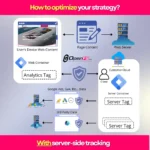If you’re searching for the best AI tools for SEO, you’re definitely not alone in this quest. After spending countless hours testing and implementing various AI-powered SEO solutions, I’ve learned that the right tools can transform your entire optimization workflow. Let me share what I’ve discovered about the most effective AI SEO tools that’ll actually move the needle for your rankings in 2025.
What Are the Best AI Tools for SEO Content Optimization?
Content optimization used to eat up most of my workday, but artificial intelligence has completely changed the game. These days, I rely on several AI-powered tools that consistently deliver results worth bragging about. Let’s dive into the ones that have genuinely impressed me.
Surfer SEO: Your Data-Driven Content Partner
Surfer SEO has become my go-to tool for content optimization, and here’s why: it uses natural language processing to analyze what’s already ranking well, then tells you exactly how to compete. Think of it as having a seasoned SEO expert looking over your shoulder while you write.
What really sets Surfer apart is its practical approach to optimization. The tool generates content outlines based on competitor analysis, which means you’re not starting from scratch. As you write, it provides real-time content scoring, so you know immediately if you’re on track. It also suggests the ideal content length and keyword density based on actual ranking data, not guesswork. Plus, the seamless integration with Google Docs and WordPress makes it feel like a natural extension of your writing process.
Semrush Writing Assistant: Beyond Basic SEO Writing
While most people know Semrush for its comprehensive SEO toolkit, their AI writing assistant is a hidden gem that deserves more attention. What I love about this tool is how it balances SEO optimization with actual readability – because what’s the point of ranking if nobody wants to read your content?
The Semrush Writing Assistant excels at suggesting SEO-friendly titles and meta descriptions that actually make people want to click. It analyzes your readability and offers specific improvement tips, not just vague suggestions. The tone of voice consistency checks have saved me from sounding like three different writers in one article. And the real-time optimization recommendations mean you’re not going back to fix things later – you get it right the first time.
AI-Powered Technical SEO Tools That Actually Work
Technical SEO can feel like trying to solve a puzzle blindfolded, but AI tools have made it surprisingly manageable. If you’re looking for a deeper dive into technical optimization, check out our comprehensive technical SEO guide.
Frase: Your Technical SEO Swiss Army Knife
Frase has emerged as a powerhouse for technical SEO, and it’s become indispensable in my toolkit. The automated site structure analysis alone has saved me hours of manual work. It identifies internal linking opportunities I would’ve missed, suggesting connections that actually make sense for users and search engines alike.
What really impresses me about Frase is its page speed optimization suggestions. Instead of generic advice like “optimize your images,” it provides specific, actionable recommendations tailored to your site. The mobile-friendliness assessment is equally thorough, catching issues that could tank your mobile rankings before they become problems.
Alli AI: Streamlining Complex Technical Tasks
Alli AI takes a different approach to technical SEO, focusing on making bulk optimizations actually feasible. If you’ve ever tried to update meta tags across hundreds of pages, you’ll appreciate what this tool brings to the table.
The bulk optimization capabilities mean you can implement site-wide changes in minutes instead of days. Real-time HTML editing lets you see exactly what you’re changing before you commit. The automated meta tag generation is smart enough to create unique, relevant tags for each page, not just template-based nonsense. And the site-wide optimization rules ensure consistency across your entire domain – something that’s nearly impossible to maintain manually.
What Are the Best AI Tools for SEO Keyword Research?
Modern keyword research isn’t just about finding search terms anymore – it’s about understanding intent, discovering opportunities, and predicting trends. AI tools have revolutionized this process, and I’ve found some that genuinely deliver insights you can’t get elsewhere. For more on developing effective keyword strategies, our keyword research guide covers the fundamentals.
Ahrefs AI Features: Intelligence Meets Data
Ahrefs has always been a keyword research powerhouse, but their AI features have taken it to another level. The AI Content Helper doesn’t just find keywords – it identifies topic gaps your competitors are missing. This means you’re not just competing; you’re finding blue ocean opportunities.
The search intent identification is particularly clever. Instead of guessing whether someone wants information or wants to buy, Ahrefs’ AI analyzes actual user behavior to tell you exactly what searchers expect. The keyword clustering and categorization features help you organize thousands of keywords into manageable, themed groups. And the content opportunity discovery has helped me find topics I never would’ve considered but that drive significant traffic.
Moz’s AI-Driven Keyword Intelligence
Moz has quietly built some of the most sophisticated AI keyword research tools in the industry. Their two-layer search intent model goes beyond basic categorization, helping you understand not just what people search for, but why they’re searching.
The domain keyword topic clustering is like having an expert organize your entire keyword strategy for you. It groups related terms in ways that make sense for content planning, not just alphabetical lists. The SERP feature analysis tells you exactly which rich snippets and special features you should target. And the competitive keyword gap identification has helped me steal traffic from competitors who thought they had everything covered.
AI Tools for Strategic SEO Planning and Content Development
Strategic planning separates successful SEO campaigns from those that just spin their wheels. AI tools now provide insights that used to require entire teams of analysts. Learn more about comprehensive SEO strategies on our SEO services page.
MarketBrew: Predictive SEO at Its Finest
MarketBrew isn’t just another SEO tool – it’s like having a crystal ball for search rankings. The predictive ranking analysis has helped me avoid costly mistakes by showing what would happen before making changes. Instead of implementing changes and hoping for the best, you can model different scenarios and choose the most effective approach.
The competition comparison metrics go deep, showing not just where you stand, but why competitors outrank you on specific queries. Content gap identification reveals topics your competitors cover that you’re missing entirely. And the strategic recommendations aren’t generic best practices – they’re specific actions based on your unique situation and goals.
Clearscope: AI-Powered Content Intelligence
Clearscope deserves mention for its unique approach to content strategy. Rather than focusing on keywords alone, it analyzes the semantic relationships between topics, helping you create content that truly satisfies search intent.
The tool excels at content grading, showing exactly how your content stacks up against top performers. Its term relevance scoring helps you include related concepts naturally, without keyword stuffing. The competitive content analysis reveals not just what competitors write about, but how they structure their content for maximum impact.
Choosing the Right AI SEO Software for Your Business Needs
Selecting AI tools for SEO isn’t a one-size-fits-all decision. Your choice depends on various factors, from budget constraints to technical requirements. Let me break down what you should consider.
Budget Considerations for AI SEO Tools
Entry-level tools (under $50/month) like Surfer SEO and Frase offer excellent value for small businesses and freelancers. These tools provide core functionality without breaking the bank, making them perfect for testing the AI SEO waters.
Mid-range options ($100-300/month) like Semrush and Ahrefs give you comprehensive suites that cover multiple aspects of SEO. If you’re serious about SEO but not quite enterprise-level, this is your sweet spot. You get advanced features, reliable data, and enough capacity for multiple projects.
Enterprise solutions ($500+/month) like MarketBrew and Alli AI are for businesses where SEO drives significant revenue. The investment makes sense when you need advanced predictive modeling, unlimited scaling, and dedicated support. These tools often include custom training and implementation assistance.
Integration Requirements and Workflow Compatibility
Before committing to any AI SEO tool, consider how it’ll fit into your existing workflow. WordPress compatibility is crucial if that’s your CMS – some tools integrate seamlessly, while others require workarounds. API access becomes important when you need custom solutions or want to pull data into your own systems.
Team collaboration features matter more than you might think. Look for tools that allow multiple users, permission settings, and shared workspaces. Data export capabilities ensure you’re not locked into one platform forever. The best tools play nicely with others, allowing you to build a comprehensive SEO tech stack.
Best Practices for Implementing AI in Your SEO Strategy
Having the right tools is only half the battle – using them effectively is what separates winners from wannabes. Through trial and error (mostly error), I’ve developed some best practices that consistently deliver results.
First, don’t put all your eggs in one AI basket. Combining multiple tools gives you comprehensive coverage and cross-validation of data. I typically use one tool for content optimization, another for technical SEO, and a third for keyword research. This approach prevents blind spots and provides multiple perspectives on optimization opportunities.
Always validate AI suggestions against real-world data. AI is incredibly powerful, but it’s not infallible. Test recommendations on a small scale before rolling them out site-wide. Keep human oversight in the optimization process – AI should enhance your expertise, not replace it. The best results come from combining AI efficiency with human creativity and strategic thinking.
Stay updated with tool features and capabilities. AI SEO tools evolve rapidly, with new features appearing monthly. Set aside time to explore updates, attend webinars, and read documentation. What seems like a minor feature update could revolutionize your workflow.
The Future of AI-Powered SEO Tools and Machine Learning
The SEO landscape is evolving faster than ever, and AI is driving much of that change. Understanding where things are headed helps you prepare for what’s coming. For a deeper look at AI’s impact on search, check out our article on AI SEO vs traditional SEO.
We’re moving toward more sophisticated search intent analysis that goes beyond basic categorization. Future AI tools will predict not just what users search for, but when and why they search, allowing for incredibly targeted optimization strategies. Advanced natural language processing will make content optimization more nuanced, understanding context and meaning rather than just keyword presence.
Predictive analytics will become standard, not premium. Every SEO tool will offer some form of “what-if” analysis, letting you model changes before implementation. And routine SEO tasks will become increasingly automated – think automatic schema markup, self-optimizing meta tags, and AI-driven internal linking.
Real-World Applications: AI SEO Tools in Action
Let me share a recent example that shows the power of combining AI SEO tools. A client came to me with a site that had plateaued in rankings despite consistent content creation. Using Surfer SEO, we discovered their content was actually over-optimized – they were trying too hard to rank instead of providing value.
We used Ahrefs’ AI features to identify search intent mismatches. Many of their “buying guide” articles were ranking for informational queries, frustrating users looking for quick answers. Alli AI helped us implement technical fixes across 500+ pages in just two days – a task that would’ve taken weeks manually.
The result? A 67% increase in organic traffic within three months, and more importantly, a 45% improvement in conversion rate because we were finally matching content to user intent. This isn’t magic – it’s what happens when you use AI tools strategically. For more success stories and strategies, visit our guide to AI-powered SEO performance.
Making Your Decision: Which AI SEO Tools Should You Choose?
After all this information, you might feel overwhelmed about which tools to choose. Here’s my straightforward advice: start with one tool that addresses your biggest pain point. If content creation is your bottleneck, begin with Surfer SEO or Frase. If technical SEO keeps you up at night, Alli AI might be your answer. If you’re drowning in keyword data, Ahrefs or Moz will bring clarity.
Remember, the best AI tools for SEO are the ones you’ll actually use. A sophisticated tool gathering dust helps nobody. Start simple, master one tool, then expand your toolkit as needed. The goal isn’t to use every AI SEO tool available – it’s to use the right ones effectively.
The SEO landscape will continue evolving, but one thing remains constant: success comes from understanding your audience and delivering value. AI tools simply help you do that more efficiently and effectively. Choose tools that align with your goals, fit your budget, and integrate with your workflow. Most importantly, remember that these tools amplify your skills – they don’t replace the need for strategic thinking and creativity.
Frequently Asked Questions
What makes AI SEO tools different from traditional SEO software?
AI SEO tools use machine learning and natural language processing to analyze patterns, predict outcomes, and provide recommendations based on vast amounts of data. Unlike traditional tools that rely on static rules and manual analysis, AI tools continuously learn and adapt, offering insights that would be impossible to discover manually. They can process competitor strategies, user behavior, and search trends simultaneously to provide actionable recommendations.
How much should I budget for AI SEO tools?
Your budget depends on your business size and SEO goals. Freelancers and small businesses can start with $30-50/month for basic tools. Growing businesses typically spend $100-300/month for comprehensive solutions. Large enterprises or agencies might invest $500-2000/month for advanced features and higher limits. Remember, the ROI from effective SEO often justifies the investment within a few months.
Can AI SEO tools replace human SEO experts?
No, AI SEO tools enhance human expertise rather than replace it. While these tools excel at data analysis, pattern recognition, and automation, they can’t replicate human creativity, strategic thinking, or understanding of brand voice. The most successful SEO strategies combine AI efficiency with human insight, using tools to handle repetitive tasks while humans focus on strategy and creative problem-solving.
Which AI SEO tool should I start with as a beginner?
For beginners, I recommend starting with Surfer SEO or Frase for content optimization. These tools have user-friendly interfaces and provide clear, actionable recommendations. They’re affordable and offer excellent educational resources. Once you’re comfortable with content optimization, you can expand to technical SEO tools like Alli AI or comprehensive suites like Semrush.
 Written by: Romulo Vargas Betancourt
Written by: Romulo Vargas Betancourt
CEO – OpenFS LLC







